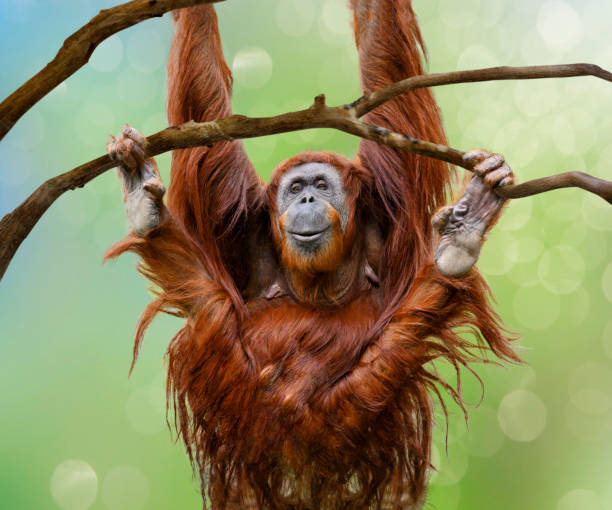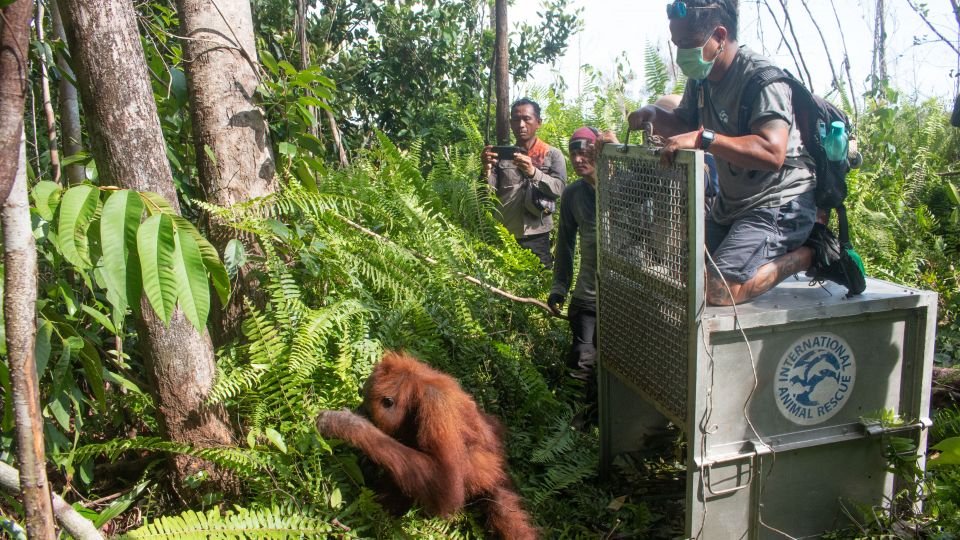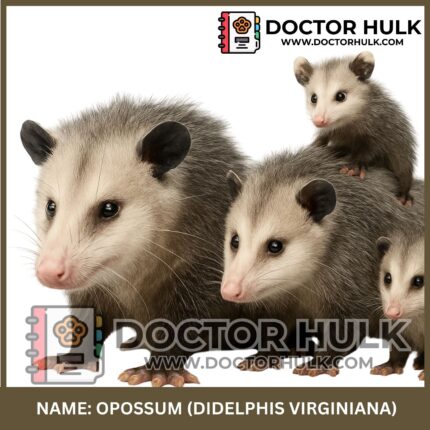Orangutans are large, intelligent apes known for their gentle nature and long, reddish-brown hair. They live high in the trees and share a lot of similarities with humans. Many people call them the “wise men of the forest” because of their calm behavior and smart habits.
Scientific Classification
-
Scientific Name: Pongo
-
Family: Hominidae (Great Apes)
-
Order: Primates
Common Names
-
Orangutan (means “person of the forest” in Malay)
-
Forest ape
-
Red ape
Geographic Distribution
Orangutans are only found in the rainforests of two islands in Southeast Asia:
-
Borneo
-
Sumatra
They live in tall, thick forests with plenty of trees, which they use for food and shelter.
Physical Characteristics
Orangutans are easy to spot because of their long arms, shaggy red hair, and thoughtful eyes.
-
Adult males can weigh over 90 kg (200 lbs)
-
They have strong arms, even longer than their legs
-
They use their feet almost like hands to grip tree branches
 Image showing a male orangutan hanging from a tree branch (Source: iStock)
Image showing a male orangutan hanging from a tree branch (Source: iStock)
Species of Orangutans
There are three main species of orangutans:
1. Bornean Orangutan
Found on Borneo Island. They are slightly larger than others.
-
Stocky build
-
Long facial hair (especially males)
-
More solitary than other species
 Image showing a bornean orangutan sitting on the grass (Source: iStock)
Image showing a bornean orangutan sitting on the grass (Source: iStock)
2. Sumatran Orangutan
Lives only in Sumatra. Slimmer and more social.
-
Lighter body and longer face
-
Lives in tighter groups
-
Endangered due to forest loss
 Image showing a sumatran orangutan holding her baby (Source: Pinterest)
Image showing a sumatran orangutan holding her baby (Source: Pinterest)
3. Tapanuli Orangutan
Recently discovered in 2017, lives in a small part of Sumatra.
-
Smallest of the three
-
High-pitched voice
-
Extremely rare (less than 800 left)
 Image showing a tapanuli orangutan in the wild (Source: Wikipedia)
Image showing a tapanuli orangutan in the wild (Source: Wikipedia)
Fun Facts
-
Orangutans are 95% genetically similar to humans.
-
A young orangutan stays with its mom for up to 7 years.
-
They make umbrella-like nests from branches and leaves to sleep in.
-
Orangutans use sticks as tools to gather insects or fruit.
-
They rarely drink water, they get it from fruit and leaves.
Human Relevance
Orangutans have a big impact on humans:
-
Help forests grow by spreading seeds
-
Loved by wildlife tourists and nature lovers
-
Teach us more about human behavior and intelligence
-
Sadly, they are harmed by logging and palm oil farming
Health & common issues
Orangutans are vulnerable to many of the same illnesses as humans.
Common health risks:
-
Respiratory infections
-
Malnutrition due to habitat loss
-
Wounds from traps or hunting
Veterinary care is needed in sanctuaries and zoos.
Conservation Status
All orangutan species are endangered or critically endangered.
-
Deforestation and illegal hunting are the main threats.
-
Wildlife organizations are working hard to protect their homes.
-
You can help by avoiding products made with unsustainable palm oil.
 Image showing an orangutan rescue team releasing a healthy ape back into the wild (Source: International Animal Rescue).
Image showing an orangutan rescue team releasing a healthy ape back into the wild (Source: International Animal Rescue).
Reach out to us at Doctor Hulk Veterinary Hospital to learn more about wild animals and how we care for them. You can also contact us via 08143397614.













Reviews
There are no reviews yet.